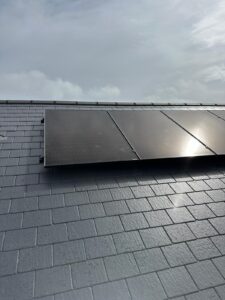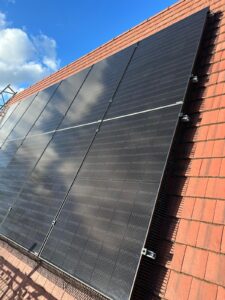
Solar Panel Regulations & Planning Permission
Solar energy is gaining popularity as a sustainable and renewable source of power. With the increasing focus on clean energy solutions, many homeowners are considering installing solar panels on their properties.
However, before embarking on such a project, it’s important to understand whether planning permission is required for solar panel installations. In this blog post, we will shed light on the regulations surrounding planning permission for solar panels.
Contents:
Planning Permission for Solar Panels
Solar panel installations fall under ‘permitted development rights’ allowing homeowners to carry out certain types of construction projects without the need to obtain planning permission. However, there are certain measures that must be met for solar panel installations to be considered within permitted development rights.
Criteria for Permitted Development
Placement and Orientation
Solar panels should be installed on the roof or the external appearance of the building, and the orientation and pitch of the panels should be similar to the existing structure. This ensures that they are integrated seamlessly into the existing structure, allowing for efficient utilisation of space.
Size and Protrusion
The panels should not exceed a certain size and should not protrude more than a specific distance from the roof or wall. This limitation is in place to maintain the visual integrity of the structure and prevent any excessive or obtrusive projections.
By following the size and protrusion guidelines, you can ensure that your solar panel installation aligns well with the architectural design of your building. This approach allows for a visually balanced and integrated appearance while maximising the potential to capture solar energy efficiently.
Location and Designation
The property should not be situated within a specifically designated area, such as a conservation area or a national park, where more stringent regulations and restrictions may be enforced.
Noise and Glare
The panels should not produce an excessive amount of noise or glare that has the potential to create disturbances or disruptions to the surrounding area.
Exceptions and Considerations
While many homeowners can install solar panels under permitted development rights, there are exceptions and additional considerations to keep in mind.
Listed Buildings
If your property is classified as a listed building or is situated within the curtilage (grounds) of a listed building, obtaining planning consent is required for the installation of solar panels.
Article 4 Directions
Some local authorities may have issued Article 4 Directions that remove certain permitted development rights. Checking for the presence of Article 4 Directions ensures that you are fully informed about any additional planning requirements or limitations that may affect your ability to make certain alterations or installations on your property.
Leasehold Properties
If you reside in a leasehold property, it is recommended to carefully review the terms and conditions outlined in your lease agreement. This is important as the lease agreement may include specific provisions pertaining to alterations and installations within the property.
Understanding these provisions will help you ascertain any requirements or restrictions that need to be considered when planning alterations, such as the installation of solar panels.

When Do You Need Planning Permission?
If your solar panel installation does not meet the criteria for permitted development or falls under any exceptions, you will need to apply for planning permission. The process involves submitting an application to your local planning authority and providing detailed information about the proposed installation.
How Many Solar Panels Can You Have Without Planning Permission?
The building regulations regarding the number of solar panels you can have without planning permission vary depending on your location and local planning authority. In many areas, you can typically install solar panels on your property without needing planning permission as long as they meet the above criteria for permitted development rights.
This includes restrictions on the size and placement of the panels, such as not exceeding a certain area or not protruding above a certain height. It is crucial to consult with your local planning authority or seek professional advice from our team to understand the specific rules and limitations that apply in your area to ensure compliance.
Do I Need Planning Permission for Solar Panels on the Ground?
The need for planning permission for ground-mounted solar panels depends on various factors, including your location and local planning regulations. In some cases, you may require planning permission to install ground-mounted solar panels, especially if they significantly alter the appearance of the land or if there are specific restrictions in your area.
However, certain jurisdictions have permitted development rights that allow for the installation of ground-mounted solar panels without planning permission, provided they meet specific criteria, such as being below a certain height or being located in non-sensitive areas.
How Much is the Grant for Solar Panels UK?
According to the UK Government’s initiative to promote energy-saving measures, including solar panels, the VAT relief on such measures has been reduced from 5% to 0%. This reduction aims to help households reduce energy bills and increase energy efficiency.
As a result, a typical household installing rooftop solar panels can save over £1,000 in total installation costs. The yearly energy expenses can be reduced by approximately £300. This reduction in VAT aims to make solar panel installations more affordable and encourage homeowners to invest in renewable energy solutions.
Are Solar Panels Worth the Investment?
Installing solar panels can significantly contribute to reducing carbon emissions and promoting sustainable energy practices. While many homeowners can benefit from permitted development rights when it comes to solar panel installations, it is crucial to understand the specific criteria and any exceptions that may apply.
Checking with your local planning authority or seeking professional advice can ensure a smooth and compliant installation process. Embracing solar power not only helps the environment but also provides long-term energy savings for homeowners.
Looking for Solar Panels?
At Solar Voltaics, we specialise in designing, installing, and maintaining solar photovoltaic (PV) systems. We help clients transition to clean and sustainable solar energy solutions through services like site assessment, system design, installation, and ongoing support.
Get in touch today to start your project with sustainable solar energy solutions at Solar Voltaics.


